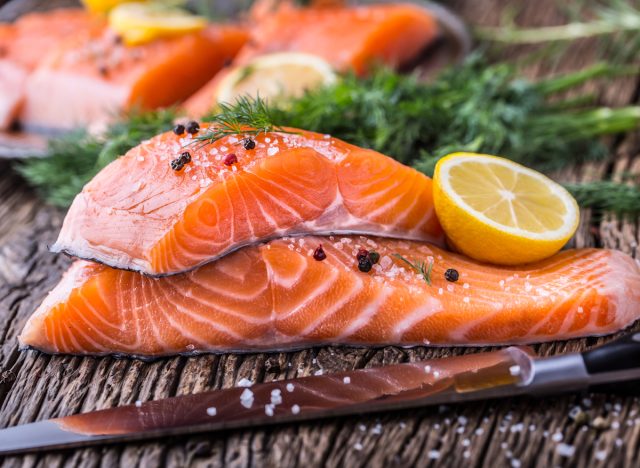What you choose to eat has more of an effect on your long-term health than you may think—especially when it comes to your heart health. It’s all about choosing the best, high-quality ingredients for your meals, and having the right protein on hand is important to keep your heart healthy for a long time to come.
“The best protein for your heart is a lean protein or one low in saturated fat,” says Amy Goodson, MS, RD, CSSD, LD, author of The Sports Nutrition Playbook and a medical expert board member. “Saturated fat, when consumed on a regular basis, can contribute to increases in total and bad (LDL) cholesterol.”
A build-up of LDL cholesterol in the bloodstream can clog up the arteries, which increases the risk of cardiovascular disease, along with many other chronic diseases. Keeping your LDL cholesterol numbers low is key for good heart health as you age, which means choosing lean proteins with little saturated fat on a regular basis.
One of the best ways you can get lean protein with low saturated fat, while also incorporating heart-healthy fats, is by eating fish! And if you’re looking for the #1 best fish for your heart, Goodson recommends choosing salmon for all of its nutritional benefits.


“Not only does salmon contain high-quality protein and nutrients like vitamins D, B6, B12, selenium, phosphorus, and potassium, it also contains omega 3 fatty acids, which are the essential unsaturated fats that your body needs,” says Goodson. “Fatty fish, like salmon, is the best supplier of heart-healthy omega 3s, and these fatty acids actually have a protective effect on the heart.”
Omega-3 fatty acids can help increase your HDL “good” cholesterol. This type of cholesterol helps to remove the excess cholesterol in your blood, carrying it back to your liver. A low amount of HDL cholesterol likely means you also have a high amount of LDL cholesterol in your blood, which can negatively impact your heart health.
READ RELATED: America's Largest Sandwich Chain Is Now Selling Subs Using This Unusual Method
According to Circulation, omega-3 fatty acids can also lower triglyceride levels and may decrease platelet aggregation, which can cause issues with blood flow to your heart.
“Omega 3 fatty acids also have an anti-inflammatory effect by buffering free radicals that can cause damage to cells,” says Goodson. This kind of cell damage can also lead to cardiovascular disease risk, according to the British Journal of Clinical Pharmacology.
In order to fully reap all the heart-healthy benefits salmon has to offer, Goodson recommends eating it twice a week. The American Heart Association recommends eating a 3-ounce serving of fatty fish twice a week—which includes women that are pregnant. While fish is known to have some exposure to mercury, Goodson points out (and research confirms) that the benefits of consuming omega-3 fatty acids far outweigh the risks of eating fish—and the American Heart Association agrees.
To get started, why not cook up this Sweet and Spicy Glazed Salmon with Roasted Veggies sheet pan recipe for dinner, or enjoy this Smoked Salmon Sandwich for lunch! For more inspiration, check out these 21+ Best Healthy Salmon Recipes, or even these 9 Things You Can Make With a Can of Salmon.
Kiersten Hickman
Source:











